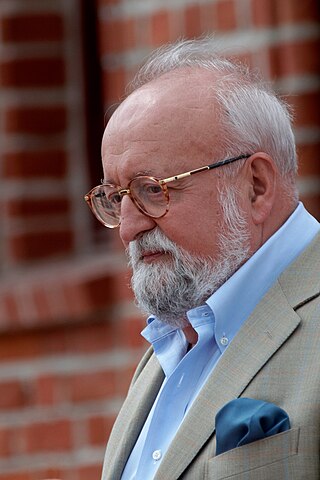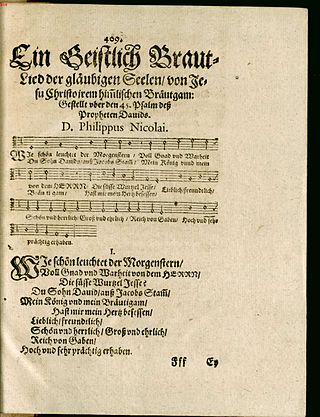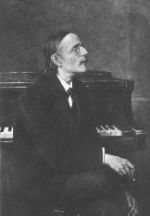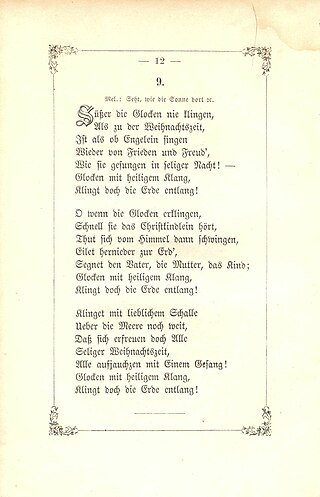
Kindertotenlieder is a song cycle (1904) for voice and orchestra by Gustav Mahler. The words of the songs are poems by Friedrich Rückert.

Verklärte Nacht, Op. 4, is a string sextet in one movement composed by Arnold Schoenberg in 1899. Composed in just three weeks, it is considered his earliest important work. It was inspired by Richard Dehmel's poem of the same name and by Schoenberg's strong feelings upon meeting his future wife Mathilde Zemlinsky, who was the sister of his teacher, Alexander von Zemlinsky (1871–1942). Schoenberg and Zemlinsky married in 1901. The movement can be divided into five distinct sections which refer to the five stanzas of Dehmel's poem; however, there are no unified criteria regarding movement separation.
"Kling, Glöckchen", or "Ring, Little Bell", is a German Christmas carol from the 19th century. The lyrics were written by Karl Enslin (1819–1875) to a traditional German folk tune. According to other sources, it was set to music in 1884 by Benedikt Widmann (1820–1910).
Alle Jahre wieder is a well-known German Christmas carol. The text was written in 1837 by Wilhelm Hey. It is usually sung to a melody attributed to Friedrich Silcher, who published it in an 1842 song cycle based on a book of fables by Otto Speckter.
"Es ist für uns eine Zeit angekommen" is a traditional Swiss Star singers Christmas carol from the Canton of Lucerne. Lyrically, there are some regional variations.

The Symphony No. 8 "Lieder der Vergänglichkeit" by Krzysztof Penderecki is a choral symphony in twelve relatively short movements set to 19th and early 20th-century German poems. The work was completed and premiered in 2005. The symphony has an approximate duration of 35 minutes. Penderecki revised the symphony in 2007 by adding a few more poem settings and the piece has expanded to around 50 minutes. Although given the designation Symphony No. 8, it was not actually the final symphony Penderecki completed before his death in March 2020; the Sixth Symphony, begun in 2008, was not completed until 2017.

Wir warten auf's Christkind... or Wir warten auf's Christkind is a Christmas album by the German punk band Die Toten Hosen, released under the alias Die Roten Rosen.

"Wie schön leuchtet der Morgenstern" is a Lutheran hymn by Philipp Nicolai written in 1597 and first published in 1599. It inspired musical settings through centuries, notably Bach's chorale cantata Wie schön leuchtet der Morgenstern, BWV 1, but also vocal and instrumental works by Baroque composers, Peter Cornelius, Felix Mendelssohn, Max Reger, Hugo Distler, Ernst Pepping, Mauricio Kagel and Naji Hakim.

Der Tod Jesu is an oratorio libretto by Karl Wilhelm Ramler. In its setting by Carl Heinrich Graun in 1755, it was the most often performed Passion of the 18th century in Germany.

"Vom Himmel hoch, da komm ich her" is a hymn text relating to the Nativity of Jesus, written by Martin Luther in 1534. The hymn is most often sung to the melody, Zahn No. 346, which first appeared in a 1539 songbook and was probably also composed by Luther. This classic Christmas carol remains popular and has inspired many choral and organ works by other composers.
"Vom Himmel hoch, o Engel, kommt", also known as "Susani", is a German Christmas carol. It was first printed in 1622 as an alternate text to an older melody. In eight stanzas of two lines each, the angels are requested to come from Heaven, bring their musical instruments, and play and sing of Jesus and Mary, and ultimately for peace for the people.
Franz Schubert's best-known music for the theatre is his incidental music for Rosamunde. Less successful were his many opera and Singspiel projects. On the other hand, some of his most popular Lieder, like "Gretchen am Spinnrade," were based on texts written for the theatre.
"Auf, Christen, singt festliche Lieder" is a German Christmas carol. A first text was written in 1778 by August Erthel, which was first published in Fulda with a first melody that year. Heinrich Bone modified the text in 1851 for his hymnal Cantate!. It was sung with different melodies.

Weihnachtslieder, Op. 8, is a song cycle of six lieder related to Christmas by Peter Cornelius, who set his own poems for voice and piano between 1856 and 1870. The full title is: Weihnachtslieder : ein Cyklus für eine Singstimme mit Pianofortebegleitung : Op. 8 / Text und Musik von Peter Cornelius. Cornelius dedicated the songs to his sister, Elisabeth Schily. The song "Die Könige" about the Biblical Magi has been translated and published separately. English versions come under the title "The Three Kings". It incorporates in the piano accompaniment Philipp Nicolai's hymn "Wie schön leuchtet der Morgenstern".

"Kommet, ihr Hirten" is a German Christmas carol from Bohemia which was derived from a Czech carol, "Nesem vám noviny". It reflects elements from the nativity story, the annunciation to the shepherds, their walk to the manger and their Adoration, inviting to follow their example. The first line, "Kommet, ihr Hirten, ihr Männer und Fraun", addresses shepherds, men, and women.
"Morgenstern der finstern Nacht" is a Christian poem in German by Angelus Silesius, first published in his poetry collection Heilige Seelen-Lust in 1657. It became a hymn with a melody written for it by Georg Joseph the same year. It is part of the 2013 German Catholic hymnal Gotteslob as GL 372, in the section "Jesus Christus". It has also been used for Advent. A common version in English, "Morning Star, O cheering sight!", was written by Bennett Harvey.

"Süßer die Glocken nie klingen" is a popular German Christmas carol with text by Friedrich Wilhelm Kritzinger to a traditional Volkslied melody, first printed in 1860. It has remained popular and is part of many song books and Christmas recordings, evoking the sound of bells as a symbol of peace and joy.

Friedrich Hermann Eickhoff, erroneously also Friedrich Heinrich Eickhoff was a German teacher, organist and song editor. Until today he is known through the Lieder Geh aus, mein Herz, und suche Freud and Ihr Kinderlein, kommet, which he created by combining sacred texts with spring melodies by August Harder and Johann Abraham Peter Schulz.
"Erfreue dich, Himmel, erfreue dich, Erde" is a Christian hymn in German. The current hymn, part of modern hymnals and song books, was written by Maria Luise Thurmair in 1963 as a Psalmlied based on Psalm 148 which deals with praise of God from his creatures. She wrote it using and expanding a short Christmas carol from the 17th century. She retained the first stanza completely and used its second half as a refrain. She also retained the old melody.

"Kommt her, ihr Kreaturen all" is a Catholic hymn with words in German by Johann Georg Seidenbusch, first published in Regensburg in 1687, using a local melody of 1657. It has appeared in regional sections of the German hymnal Gotteslob. The hymn was translated into English as "Come all ye creatures of the Lord". It is commonly used as a hymn sung during processions on the Feast of Corpus Christi.













